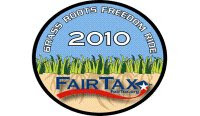I hope you all had a good Thanksgiving. Now it's back to dieting and back to blogging:
You think Corporate taxes have nothing to do with you? Well think again. The costs of running a corporation are huge and they pass those costs right through to the consumer so they will have the money to pay their corporate taxes at taxtime.
By eliminating these taxes, the price of new goods and services should go down. The competitive nature of business will not allow these prices to stay at today's level. We should see a drop in prices equivilant to the amount of the sales tax (23%). This may take some time since a free market is a self-adjusting market. When the grocery store across the street lowers the price of bread by 23% because he no longer has to pay payroll taxes or income taxes, the other grocery stores in the area will do the same in order to compete. You will be the winner. To take this a step further, the corporation that baked the bread for the grocery store can lower his prices because of the same thing - his costs will be lower and he will pass that savings on to the grocery store or lose the business to a baker who does pass on these savings.
Further on down the line, the corporations that provided the ingredients to the baker for the bread will lower their prices and then finally the farmer in the field who grows the wheat for the bread can lower his prices because everything he has to purchase to maintain his farm can be bought at a lower price.
Do you see the snowball effect this will have on the price of everything? By the time all of the "hidden taxes" are removed the price of new goods and services will probably be lower, even with the sales tax added. Here are some statistics dealing only with the cost of compliance with the tax code, taken directly from the FairTax Website (http://www.fairtax.org/) : "Compliance with the tax code is not only very difficult and complicated, consuming a total of 6 billion hours, but unreasonably expensive as well. It is estimated that it costs taxpayers $265.1 billion for tax filing, tax record keeping, and tax reduction advice. That's just shy of $900 for every man, woman, and child in America! We have taxation without comprehension!"
Wow! By the time we buy that bread at today's prices, we still have to put up with the tax accountant and the IRS. It's just not fair. I would rather see the total cost of my tax dollars on my loaf of bread receipt rather than knowing there are hidden costs and added-on taxes and not being able to control it or know for sure how much I am really paying in taxes.Tomorrow we will discuss the Pre-bates, which even out the playing field for the poor and the elderly.
Subscribe to:
Post Comments (Atom)

1 comment:
Bobbie, Bobbie,
In one short post, you have managed to promote two Fairtax myths---first, that prices will remain about the same or even fall, and second, that cost savings "cascade" up through the various levels of production. Wrong, wrong, wrong!!
Rather than prolong this post, as for cascading savings, please go to fairtaxblog.com, select the July 2007 archives, and scroll down to the 6th entry. Read carefully and you will find out that cost savings as a percentage of costs do not accumulate. I know, it isn't intuitively obvious, but a bunch of math majors show us what really happens.
As for prices, unless you believe that everyone will take a gross pay cut down to the current net pay amount, (and that won't happen for fairness and contractual reasons), then the most that business owners can reduce prices when the business income and payroll taxes and compliance costs are removed is on average about 10%. Which means that after tax prices have to rise by 17%. (1.00 x .9 x 1.3 = 1.17)
The whole subject of prices seems to be the "third rail" of the Fairtax advocates. Try all you want, you won't find one bit of Fairtax research on the subject. Competition can only do so much, and the competition that exists today has already established a business's pay scale, shareholder payments, profit margins, market share, and prices. So, the only way a business can reduce costs under the Fairtax is by the elimination of tax related costs. Your $265 billion in compliance costs spread over 20 million businesses adds 2.5% on average to costs. There is about the same savings in business income taxes--2.6%. Payroll taxes are the final cost savings and, depending on the percentage of costs that the payroll tax represents, might save another 4%-5%. Frankly, projecting a 10% cost savings is very optimistic and assumes all cost savings are applied to price reductions.
I don't think you are purposly putting out bad information, but on the subject of prices, I can assure you that the most likely scenario is that prices are going up, period! Otherwise, all businesses will go bankrupt, and I don't think that's the desired outcome.
Just for fun, try asking any business in your neighborhood just what percentage of costs the income and payroll taxes represent. And, just how much could be saved if the business didn't have to file a federal income tax return every year?
Good luck!
Post a Comment